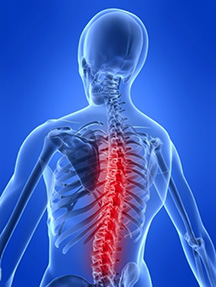 Acupuncture and Traditional Chinese Medicine (TCM) are very effective in treating back pain naturally. They can also be used together with traditional Western treatments to maximize your healing and recovery.
Acupuncture and Traditional Chinese Medicine (TCM) are very effective in treating back pain naturally. They can also be used together with traditional Western treatments to maximize your healing and recovery.
Back pain is an extremely common problem that plagues more than eighty percent of Americans some time during their lives. In fact, it’s one of the top reasons people seek medical care. Unfortunately, back pain is not always easy to diagnose or relieve. Low back pain in particular often becomes a long term dehabilitating condition.
Acupuncture and Traditional Chinese Medicine (TCM) are very effective in treating back pain naturally. They can also be used together with traditional Western treatments to maximize your healing and recovery.
What Can Cause Back Pain?
There are many possible causes for back pain, including strained muscles or ligaments, often caused by improper lifting, sudden movements or traumatic injury. Other culprits can include arthritis, structural abnormalities of the spine, or the disks between the vertebrae bulging or rupturing and pressing on a nerve. Depending on the specific diagnosis, back pain is generally treated with medications, physical therapy, chiropractic care, and in some cases, surgery.
A Safe Natural Approach
Practitioners of acupuncture and TCM view back pain another way. An acupuncturist will not only work to relieve your symptoms, but will also work to find and treat the underlying cause of your pain. In a study conducted at a Swedish hospital, doctors concluded that acupuncture provided long-term relief along with improvements in physical activity levels, quality of sleep and the diminished use of pain medication.
Acupuncture and TCM are based on the concept that Qi (pronounced “chee”), or vital energy, flows through the body in channels called meridians. If Qi becomes stagnant, unbalanced or deficient, symptoms such as back pain, ache and inflammation can result. This can happen for any number of reasons, from injury and illness to stress or external invaders such as wind or dampness. Back pain can arise from disharmonies such as:
- Stagnation – type pain that is often linked to sudden, stabbing, severe pain and related to sprains, strains or trauma. It can be accompanied by stiffness and tightness and becomes worse with rest. If it occurs often in the same area(s) it may reflect an underlying deficiency.
- Cold, damp obstruction – type pain that is generally worse in the morning and exacerbated by cold or damp weather. This type of pain condition may be associated with numbness, swelling and a sense of “heaviness.” Heat improves this condition.
- Deficiency – type pain that is usually a chronic condition that presents with a “dull” pain and improves with rest.
Reestablishing Balance
Once your practitioner has determined the cause(s) of your back pain, he or she will create a specific treatment plan designed to address your concerns and boost your overall health and vitality. During acupuncture treatments, your practitioner will insert fine, sterile needles into specific acupuncture points along the meridian pathways in order to restore the balance and flow of Qi. He or she may also perform acupressure or other types of therapy, based on your unique issues and symptoms.
“Acupuncture represents a highly promising and effective treatment option for chronic back pain. Patients experienced not only reduced pain intensity, but also reported improvements in the disability that often results from back pain, and therefore in their quality of life.”
– H. Endres, MD
Your practitioner may also suggest lifestyle changes and self-care techniques, especially if you struggle with chronic pain. These may include:
- Improving your posture – Examine your posture in a mirror. Try to stand with your head up, shoulders back and pelvis in a neutral position. When sitting, try to sit upright with your feet flat on the floor and your knees and hips level. Try to balance your weight evenly when walking and standing.
- Exercising – Keep your back and abdominal muscles strong with regular exercise. Yoga and Qi Gong are both gentle and effective. Consider adding aerobic exercise as well to improve your overall health and reduce stress.
- Managing stress – Stress can take a real toll on your health and contribute to muscle pain. Meditation or deep-breathing techniques can help you stay calm and relaxed. Massage is another great way to help relieve stress and loosen tense muscles.
Dr. Jay Sordean and The Redwood Clinic in Berkeley, California can help you with your back pain. Call us at today (510) 849-1176 to set up a consultation.


 You’ve settled into a warm and comfortable bed, you close your eyes and nothing!! You just can’t fall off to sleep. Hours and hours go by and you are still awake. The next day you’re tired, grouchy, and unable to focus. Does this sound all too familiar?
You’ve settled into a warm and comfortable bed, you close your eyes and nothing!! You just can’t fall off to sleep. Hours and hours go by and you are still awake. The next day you’re tired, grouchy, and unable to focus. Does this sound all too familiar?
 Common headache medications do not address the root cause of headaches and can have harmful side effects. Acupuncture and Traditional Chinese Medicine (TCM) offer a safe and effective approach to relieving headache pain, without causing harmful side effects.
Common headache medications do not address the root cause of headaches and can have harmful side effects. Acupuncture and Traditional Chinese Medicine (TCM) offer a safe and effective approach to relieving headache pain, without causing harmful side effects.



